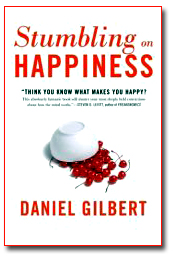Books |
Stumbling on Happiness
Daniel Gilbert
By
Published: May 15, 2023
Category:
Psychology
I was nearing the thrilling conclusion of “Stumbling on Happiness” when I came across a sentence so brilliant, so subtle, so genuinely funny that I had the experience readers crave but rarely enjoy — I laughed out loud.
This is the sentence: “My friends tell me that I have a tendency to point out problems without offering solutions, but they never tell me what I should do about it.”
Okay, maybe it would be better if you read the previous 222 pages. Because then you would know that one of the wittiest guys ever to teach at Harvard has not written the ultimate self-help book. That is, he does not hand you the keys to happiness and invite you to take it out for a spin. Just the opposite — he shows you, over and over again, both logically and by reference to research, how your efforts to be happy are so misguided that they practically guarantee failure.
Dan Gilbert is apologetic about that. But after assuring you that the self-help book you want would not, in fact, tell you how to be happy, he makes the case for “a book that describes what science has to tell us about how and how well the human brain can imagine its own future, and about how and how well it can predict which of those futures it will most enjoy.” I rarely say this: You might enjoy his Ted Talk.
He begins this exploration with “The Sentence.” Before they die, he jokes, all psychologists must write it. The trick is to wait until you’re almost dead, so you won’t be proven wrong in your lifetime. Professor Gilbert, no coward, plunges in. And so his way of completing The Sentence — “The human being is the only animal….” — is this: “that thinks about the future.”
And there, of course, is the problem. Sometimes, he notes, “we’d rather think about it than get there.” For example, volunteers asked to imagine themselves asking for a date with someone on whom they had a major crush were more likely to want to enjoy their fantasies than pick up the phone.
On the other hand, when we imagine an event, we tend to overestimate how enjoyable it will be. That’s a particularly American trait — we generally believe in a golden future. Even challenges thrill us; cancer patients turn out to be more optimistic than their healthy neighbors.
Funny thing about the mind: When we do imagine unpleasantness ahead, the imaginative process minimizes its impact. That’s not based on reality. It’s because humans have “a passion for control” and if we lose that ability we get depressed. We prefer to imagine we know where we’re going. [To buy the paperback from Amazon, click here. For the Kindle edition, click here.]
And there’s the next rub: We imagine. That’s useful for artists in the act of creation, less so for civilians in the mainstream of life. Because there is a vast difference between what we imagine and what’s real. The facts elude us. “You are a very fine person, I’m sure,” Gilbert writes. “But you are a very bad wizard.”
Some fun facts along the way: You will regret what you did not do more than what you did. We make big choices shaped on our perception of future regrets. Almost any explanation, however implausible, reassures us. The only known symptom of empty nest syndrome is “increased smiling.”
And then Professor Gilbert makes his big point. If we want to know how to deal with a problem, we might do well to ask someone who’s experiencing it. Why don’t we? Because we believe people are unique. We don’t want to know otherwise: “Like most people, you don’t want to know you’re like most people.”
So imagination is a great gift. Finding a surrogate may be a greater one: “The best way to predict our feelings tomorrow is to see how others are feeling today.”
Not what you want to hear? Of course not. But doesn’t it make you feel better to know there is a better way — even if you’re hard-wired not to take it? I, for one, am infinitely amused by that conclusion. Indeed, it sort of makes me happy.


